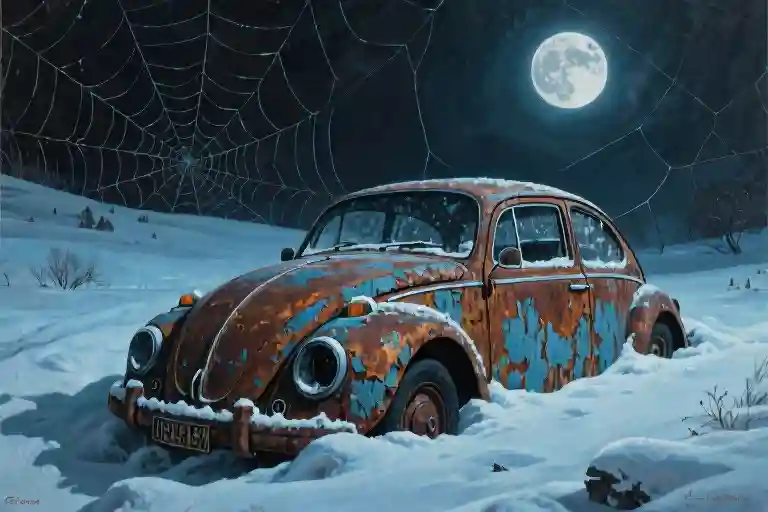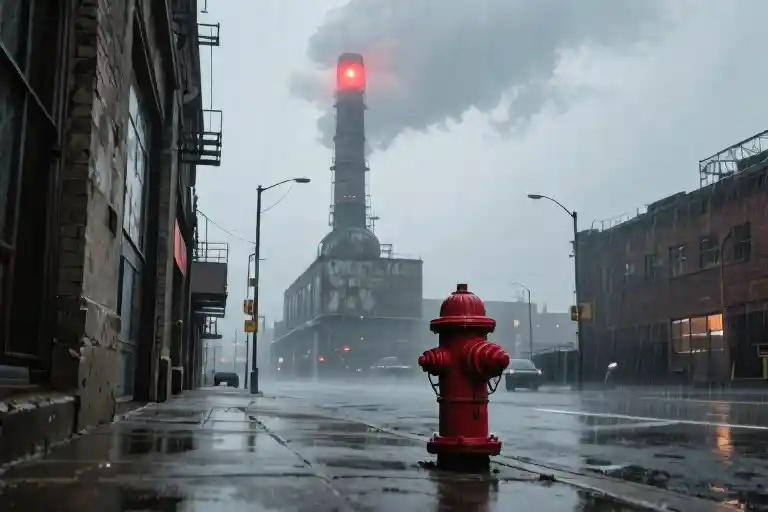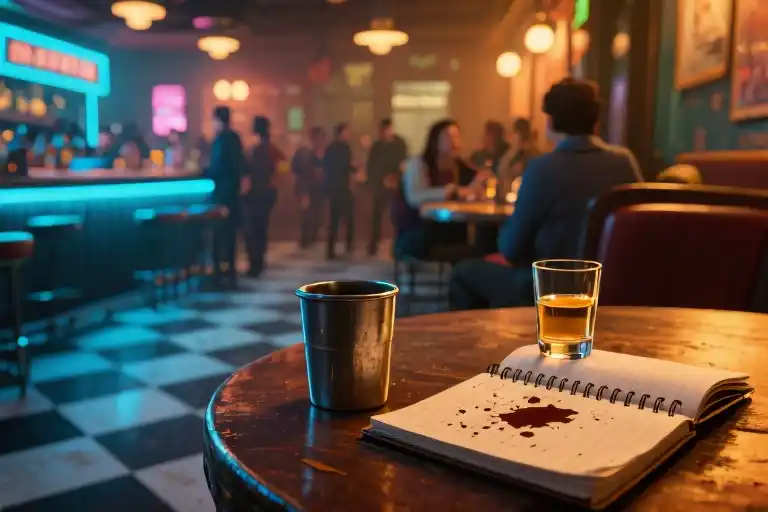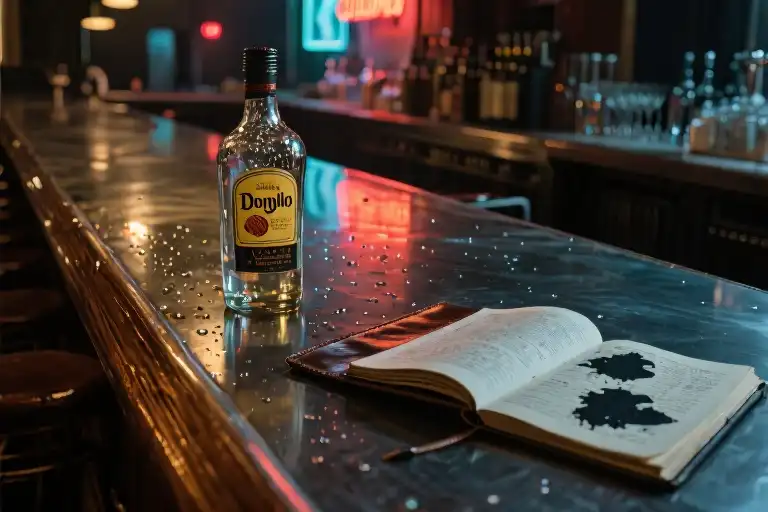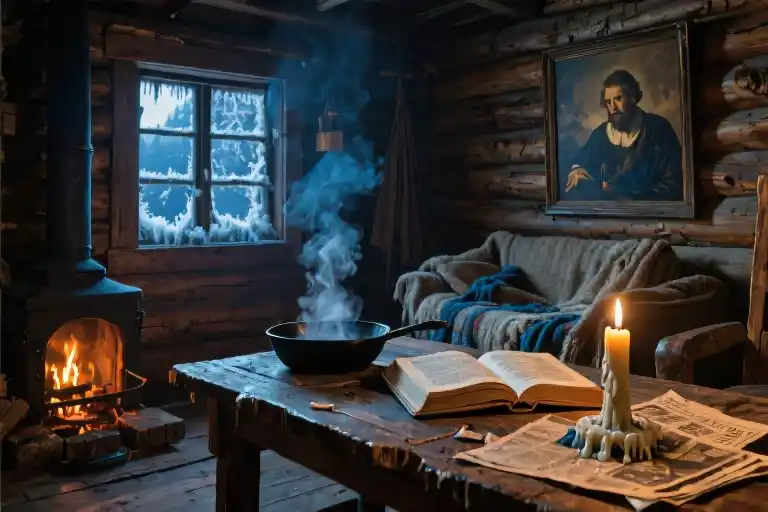The beer bottle shattered against the porch light with a sound like ice cracking over a frozen lake. Rust-colored glass rained down onto the warped floorboards, each fragment catching a sliver of that goddamn moon. “Moon and its goddamn stories,” he growled, watching the reflection of his own twisted face in the shards. Somewhere above the eaves, a sparrow startled into flight, wings beating against the heavy air like a trapped thought trying to escape.
He could still smell the iron tang of the bulb’s last glow – that strange, spiderweb light that had flickered on without anyone touching the switch. It was always like this when the moon got full. Things happened without cause. Beer cans dented themselves against the siding. Paint peeled from the window frames in perfect spirals. And now this: his boy walking up the drive like a ghost summoned by lunar gravity, right when the light decided to burn itself out.
The bottle neck was still in his hand, jagged edges biting into his palm. He could feel the ridges of his fingerprints catching on the glass, each whorl and arch mapped out in tiny cuts. Funny how the body remembers pain better than it remembers tenderness. His wedding ring had left less of a mark when he’d thrown it into the creek all those winters ago.
Outside, the snow kept falling in that indifferent way it had, piling up on the hood of the ’87 Volks like time accumulating on a junked car. He counted the flakes melting against his sleeve – one, two, three – same as he’d counted the cracks in the ceiling paint that morning. Always counting, never adding up to anything.
Some truths don’t wait to be discovered. They settle on you like dust, like snow, like the patina on a copper roof. This was his: a man alone with a broken light and too many empty bottles, watching the moon write stories he never asked to be in.
Snow and the Violence of Stillness
The beer can sweated in his hand, each droplet tracing a path down the aluminum that mirrored the cracks in the porch’s peeling paint. Dad counted them absently – seven drops, seven fissures – as the snow muffled the creak of his rocking chair. A sparrow landed on the paint’s curled edge, its weight barely disturbing the fragile balance of decay.
That’s when the porch light flickered on without human touch, casting a rust-colored glow that clung to everything like spiderwebs. The sudden illumination sent the bird startled into flight, wings beating against the heavy air. Dad didn’t flinch. He watched the light’s strange hue stain the snowbanks, turning them the color of old blood.
Magical realism isn’t about the fantastic overpowering the real – it’s about the moments when reality itself becomes porous. The way a simple bulb burning with impossible color can reveal more about a man’s soul than any psychological profile. Dad took another swig, the beer’s bitterness mixing with the metallic taste the strange light seemed to leave on his tongue.
Some truths announce themselves quietly. The matching numbers of droplets and cracks. The exact moment weight becomes too much for weathered paint to bear. The way a father’s resentment can stain an entire household with its peculiar hue, as tangible as that rust-colored light.
Outside, the snow continued falling, each flake a tiny surrender to gravity. Inside the beer can, the last swallow waited, warm and flat. Dad’s thumb rubbed at the condensation, smearing the perfect count he’d made earlier. The numbers didn’t matter anymore. Nothing did, except the way that damned bulb kept glowing without anyone touching the switch, as if the house itself had decided to bear witness.
When the sparrow didn’t return, he crushed the empty can against his knee. The sound echoed like distant thunder across the frozen yard.
Wrist and the Crescent Mark
The ’87 Volks sat in the driveway like a rusted relic, its passenger door creaking open to release the boy onto the ice-veined pavement. Each step left a fractured imprint in the frozen ruts, the sound of his sneakers crushing snow louder than it should have been. The porch light above him buzzed with a dying insect’s persistence, its rust-colored glow painting spiderweb shadows across his forehead as he reached for the doorknob.
Fingers grazed cold metal just as a hand clamped around his wrist—thumb pressing into the tender underside where blue veins surfaced. “Hey boy?” The voice carried the stale warmth of canned beer. “You flick on that porch light?” The question hung between them, its edges sharp with something beyond curiosity. Three rapid flickers from the bulb overhead answered instead of the boy, the light stuttering like a failing heartbeat. Meltwater from his untied shoelaces darkened the warped floorboards, spreading in uneven blotches.
Somewhere beyond the porch, the moon watched through a scrim of clouds. It had seen this before—the way calloused fingers could leave crescent-shaped bruises on skin, how a father’s grip could make a wrist feel suddenly fragile as a sparrow’s hollow bone. The boy’s pulse jumped against the man’s palm, a trapped thing fluttering where the radius and ulna nearly met. Neither moved until the wind changed direction, carrying the metallic tang of the Volks’ corroded frame and the wet-earth smell of the neglected garden where beer cans went to die.
Later, when the door finally slammed shut behind them, the bulb would shatter without human touch. Glass shards would litter the porch alongside a single sneaker lace, its frayed ends stiffening in the cold. But for now, there was only the wrist, the light, and the weight of unasked questions thicker than the winter air.
The Moon’s Crimes
The aluminum can crumpled in his fist before he threw it. Not at the boy—never at the boy—but at that pale bastard hanging smug above the porch. The moon didn’t flinch when the can passed through its face, didn’t so much as ripple when the metal hit the dirt and unfolded into something brittle and winged.
‘Never jump-started the Chevy when the battery went dead winter of ’83,’ Dad said to the sky. His voice carried that particular rasp of a man who’d smoked through three packs of unfiltered truths. ‘Never made Martha stay when she packed her damn floral suitcases.’ The garden swallowed his words along with the bird-shaped beer can. Cracked earth stretched between his boots like the map of a country that’d stopped feeding its people.
I watched from the Volks, knees bumping the stick shift, counting his indictments the way other kids counted shooting stars. Each ‘never’ landed heavier than the last:
- Never cooled the sun when it licked the cornfields dry
- Never unclenched his hands after the layoffs at the plant
- Never answered when he asked why truths always picked the unwilling
The can-bird twitched in the dirt, its hollow bones catching moonlight. Dad nudged it with his boot and the skeleton disintegrated into rust flakes. That’s when I noticed—his fingernails matched the color exactly, those half-moons under his skin holding the same oxidation as everything else he’d ever touched.
Magical realism isn’t about inventing wonders; it’s about exposing how the ordinary has always been haunted. The moon didn’t change that night. It simply stopped pretending to be innocent.
The aluminum can tumbled through the dead grass with a hollow rattle, its crumpled form catching the moonlight at odd angles. For a moment, the dented surface reflected something that wasn’t there—a child’s crude drawing of a smiling moon, the kind made with yellow crayon on construction paper. The kind that used to hang on refrigerators before magnets lost their hold.
Truths pick their men like crows pick bones. The thought arrived uninvited, the way memories do when you’re too tired to fight them off. He didn’t remember teaching the boy to draw those fat, happy crescents. Didn’t remember much of anything before the debts and the drought and the way his wife’s perfume lingered in the car for exactly seventeen days after she left. But the moon remembered. The goddamn moon with its tidal pull on everything useless—tears, women, crops that wouldn’t grow.
He ground the can deeper into the dirt with his boot heel. The metal shrieked like a dying animal, which seemed appropriate. Out here, everything ended this way—not with ceremony but with slow erosion. The paint peeled without drama. The porch sagged without announcement. Even the boy had stopped asking why the refrigerator hummed louder at night, why the screen door only latched when you kicked it just so.
Somewhere beyond the property line, a crow called twice. The sound carried that particular weight of things observed but not commented on. It knew what happened to men who stared too long at the moon. Knew about the truths that came scratching at your door after midnight, wearing familiar faces.
The can’s reflection wobbled as his shadow passed over it. For half a breath, the crayon moon seemed to pulse—not with light, but with the particular warmth of small hands pressing too hard on paper. Then the wind shifted, and it was just aluminum again. Just another thing he’d thrown away that refused to stay gone.

